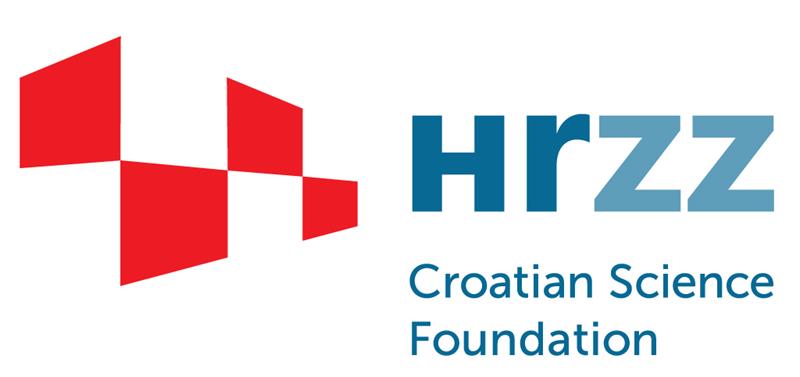HRZZ-uBC

Role of microbiota in bladder cancer development - µBC
(Research project)
Project leader: prof. Janoš Terzić, MD
Project duration: 08.03.2021. - 07.03.2025.
Postdoctoral fellow:
Blanka Roje, PhD (until April 2023)
PhD students:
Maria Bošković, mag. mol. biol. (until July 2023)
Dora Knezović, MD (until October 2024)
Nives Matković, mag.biochem
Collaborators:
Assistant prof. Jelena Korać Prlić, University of Split, School of Medicine, Split, Croatia
Assistant prof. Marina Degoricija, University of Split, School of Medicine, Split, Croatia
Prof. Katarina Vilović, University of Split, School of Medicine and University hospital Split, Split, Croatia
Prof. Marijan Šitum, University of Split, School of Medicine and University hospital Split, Split, Croatia
Prof. Ozren Polašek, University of Split, School of Medicine, Split, Croatia (until 31.01.2023.)
Michael Zimmermann, PhD, EMBL Heidelberg, Njemačka
Summary:
Bladder cancer (BC) is the fourth most common cancer in men after prostate, lung and colon cancer. It is three to four times more common in men than in women. Bladder cancer can be caused by chronic infection with Schistosoma haematobium, while the main therapeutic approach is ”infection” with Bacillus Calmette Guerin (BCG). These facts clearly highlight the importance of microbes (microbiota) in the pathogenesis of bladder cancer. Recent research, including ours, has shown that urine is not sterile, and it is becoming clear that the urine microbiota of patients with BC and in healthy individuals differs. The project plans to investigate three important elements of the relationship between microbiota and bladder cancer. First, we will investigate changes in the composition of the urine microbiota during the treatment of bladder cancer with BCG immunotherapy. Although BCG was introduced more than 40 years ago, the mechanism of its action is not entirely clear. Most studies have investigated the response of immune and urothelial cells during BCG treatment, while the bladder microbiota has been largely neglected. Therefore, we plan to monitor changes in the urinary microbiota in patients during BCG treatment and to link these changes to tumor recurrence. Second, mice with the dysfunctional molecule TLR4, which is a receptor for Gram-negative bacteria (such as Escherichia coli and Fusobacterium nucleatum), will examine the role of TLR4 as well as the potential role of Gram-negative bacteria in bladder cancer. Third, by induction of BC In germ free mice, we will study the overall contribution of the whole microbial community to the development of BC. By studying patients with bladder cancer and mouse models for the disease, the proposed project seeks to identify important aspects of the role that microbiota play in the development and recurrence of BC. Identification of microbes or microbial-related molecular elements important for BC pathology would open up new possibilities in diagnosis as well as in the prevention and treatment of bladder cancer.
Relevant publications:
- Gut microbiota carcinogen metabolism causes distal tissue tumors. ROJE B, Zhang B, Mastrorilli E, Kovačić A, Sušak L, Ljubenkov I, Ćosić E, Vilović K, Meštrović A, Vukovac EL, Bučević-Popović V, Puljiz Ž, Karaman I, TERZIC J, Zimmerman M. NATURE 2024 Aug;632 (8027):1137-1144. IF: 50,5
- MyD88 Signaling Accompanied by Microbiota changes Supports Urinary Bladder Carcinogenesis. Knezović D, Milić Roje B, Vilović K, Franković L, Korac-Prlic J, Terzić J. Int J Mol Sci. 2024 Jun 29;25(13):7176. doi: 10.3390/ijms25137176.
- DNA Methylome Changes of Muscle- and Neuronal-Related Processes Precede Bladder Cancer Invasiveness. Bošković M, Roje B, Chung FF, Gelemanović A, Cahais V, Cuenin C, Khoueiry R, Vilović K, Herceg Z, Terzić J. Cancers (Basel). 2022 Jan 19;14(3):487. doi: 10.3390/cancers14030487.
- Stat3 signaling is essential for bladder cancer progression. Korac-Prlic J, Degoricija M, Vilović K, Ivanisević T, Haupt B, Franković L, Grivennikov S, Terzić J. Cancer Letters 490, 2020, 89-99. doi: 10.1016/j.canlet.2020.06.018. Impact factor: 9,1.
- Microbiota Alters Urinary Bladder Weight and Gene Expression. Roje B, Elek A, Palada V, Bom J, Iljazović A, Šimić A, Sušak L, Vilović K, Strowig T, Vlahoviček K, Terzić J. Microorganisms. 2020 Mar 17;8(3):421. doi: 10.3390/microorganisms8030421. IF 4,167
- Vitamin A enriched diet diminishes early urothelial carcinogenesis. Korac-Prlic J*, Zupančič D*, Erdani Kraft M, Frankovic L, Vilovic K, Jeruc J, Romih R, Terzić J. Cancers (Basel) 12, 2020, 1712. doi: 10.3390/cancers12071712. IF 6,126
- The dynamics of the inflammatory response during BBN-induced bladder cancerogenesis in mice. Degoricija M, Korac-Prlic J, Vilovic K, Ivanisević T, Haupt B, Palada V, Petković M, Karaman I, Terzić J. Journal of Translational Medicine 17, 2019, 394 doi: 10.1186/s12967-019-02146-5. IF 4,124
- The urinary microbiome associated with bladder cancer. Bučević Popović V, Šitum M, Chow CT, Chan LS, Roje B, Terzić J. Sci Rep. 2018 Aug 14;8(1):12157. doi: 10.1038/s41598-018-29054-w. IF 4,011; 168 WoS citations.

Role of inflammation in bladder cancer pathogenesis - iBC
(HRZZ Research project)
Project leader: prof. dr. sc. Janoš Terzić
Project timeframe: 28.10.2015.- 27.10.2019.
Collaborators:
prof. dr. sc. Marijan Šitum
prof. dr. sc.
Ivan Đikić, Goethe University School of Medicine, Frankfurt am Main, Germany
prof. dr. sc. Sergei Grivennikov, Fox Chase Cancer Center, Philadelphia, USA
Project summary:
Around 20% of cancer deaths are a consequence of chronic inflammation. Viral and bacterial infections, parasitic infestation, autoimmunity or chemical irritants cause inflammatory changes that stimulate cancer initiation, promotion and metastasis. We and others have shown that main molecular links between inflammation and cancer are cytokine IL-6 and its transcription factor STAT3. It is becoming obvious that microbiome composition of particular niche is important element of inflammation and cancer development. The role of inflammation in urinary bladder cancer (BC) pathogenesis is poorly understood although chronic inflammation caused by
Schistosoma haematobioum has pro-tumorigenic effect while acute inflammation induced by BCG is successfully used as a therapy for BC.
This project addresses fundamental questions of bladder cancerogensis. If altering STAT3 activity has inhibitory effect on BC development that finding can lead to new therapies (use of STAT3 inhibitors) for established BC. Findings generated by the microbiome analysis can lead to novel preventive measures (microbiota manipulation by antibiotics or vaccination).
Print page

